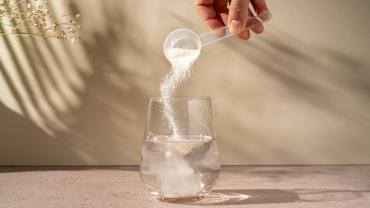
The skin is the body’s largest organ and undergoes many changes during aging. The skin is subject to aging due to internal factors and external factors. Internal factors may include the body’s nutrient and antioxidant status. External factors, like environmental conditions (for example, wind, sun exposure, and cold air) and lifestyle factors, such as smoking status, alcohol use, psychological stress, and sleeping habits, may all contribute to aging skin and decreased collagen. Collagen loss may contribute to unfavorable skin changes, including wrinkles, sagging skin, dull-looking skin, and poor wound healing. Aesthetic practices like facials, peels, microneedling, and laser treatments may improve skin health outcomes. Introducing collagen to the aesthetic treatment plan may be a supportive approach for overall skin health.
Collagen’s Role in Skin Health
Collagen breakdown begins in the early to late 20s. By the age of 80, up to 75% of collagen production has decreased. Collagen is used in many areas of the body and may help support normal wound and tissue healing, cornea and gum health, and promote healthy hair texture. Collagen protein is a major structural component of the skin, constituting 75% of the skin’s dry weight, and may support post-procedure healing. Outcomes from human studies suggest that collagen may support the skin’s appearance by “increasing hydration, elasticity, firmness, wrinkle-reduction, and skin rejuvenation.”
In fact, after oral administration, collagen goes through the digestive process, reaches the small intestine, and is absorbed into the bloodstream. Once in the bloodstream, it travels throughout the body but is distributed in the dermis layer of skin, where it resides for up to 14 days. These surprising results were seen in rats, and it’s unclear if the outcomes will be similar in humans. However, studies in humans have reported promising outcomes.
Sixty-four individuals were randomly assigned to be given a placebo or 1,000 mg (1 gram) of collagen peptides once daily for 12 weeks. The authors wanted to investigate the effect of collagen peptides on skin health. Compared to the placebo group, the experimental collagen group showed significant improvements in parameters of skin hydration, elasticity, and wrinkling at 12 weeks. It’s important to note that skin hydration in the individuals given the collagen peptides exhibited increased skin hydration after six weeks, suggesting that hydration results were seen sooner. A systematic review (n = 805) confirmed promising results for the short- and long-term effects of oral collagen supplements (varying between 2.5 g per day and 10 g per day) for wound healing and skin aging. The researchers concluded that individuals taking collagen supplements had increased skin elasticity, hydration, and dermal collagen density.
The Supporting Role of Collagen Post-Aesthetic Treatment
Aesthetic practices like facials, peels, microneedling, and laser treatments support skin health by carefully breaking down the epidermis and, in some cases, the dermis layers of the skin. Microneedling creates microscopic punctures in the skin, promoting new collagen formation. Hydrolyzed collagen may support the skin post-procedure in two ways. The first is that hydrolyzed collagen may be absorbed as larger collagen peptides and free amino acids, and amino acids provide the building blocks for proper collagen formation. The second is that the collagen peptides may help promote new collagen by attenuating the specific cells within the skin that produce it.
After aesthetic procedures, keeping the skin hydrated and utilizing collagen-stimulating peptides is typically recommended. Although topical moisturizers are widely used in basic skin care, interest is growing in potentially moisturizing and nourishing the skin from the inside with dietary collagen. Many individuals, such as older adults, lack adequate protein in their diet. Even among those with a high protein intake, the richest sources of collagen (for example, animal skins, bone broth, and tendons) are not typically part of the modern Western diet. The amino acids of dietary collagen are very similar to those in human collagen. Thus, collagen peptide supplements may support normal body collagen turnover and renewal.
Conclusion
Collagen may help support skin health and optimize post-procedure healing, making it a valuable addition to any aesthetic treatment plan. By promoting skin hydration, elasticity, and collagen formation, hydrolyzed collagen offers internal support that complements aesthetic skincare practices. As aesthetic practices continue to evolve, incorporating collagen supplementation can enhance outcomes by facilitating tissue repair and rejuvenation. Whether through improved hydration or supporting the skin’s natural healing processes, collagen is a powerful tool for both patients and practitioners aiming for radiant, resilient skin.
To learn more about skin health:
Getting to the Root – How Two Novel Nutraceuticals Work Together to Promote Clear Skin
Why Does Nutrition Belong at the Center of Every Aesthetic Practice?
Skin Health: The Benefits of Collagen Peptides
By Bri Mesenbring, MS, CNS, LDN and Danielle C. Male, MS, CNS, LDN